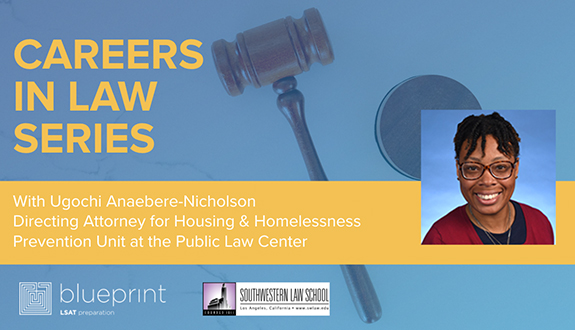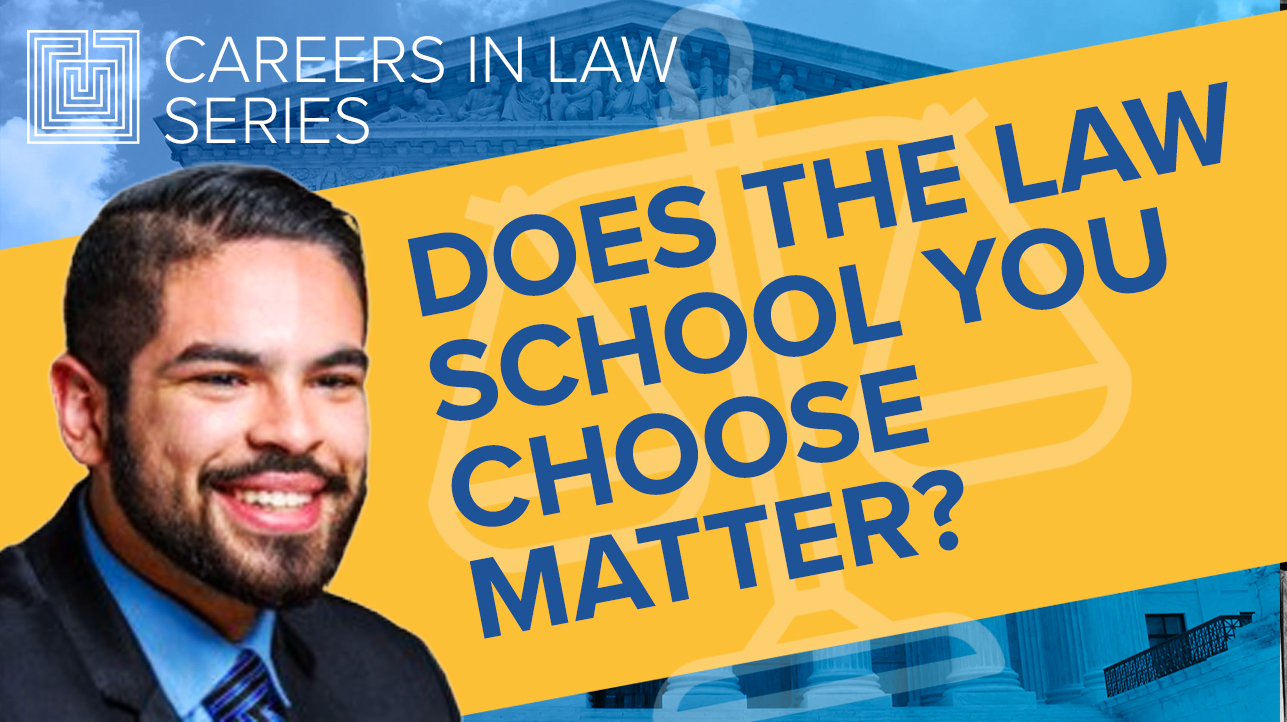Careers in Law Episode 1: Housing & Homeless Prevention with Ugochi Anaebere-Nicholson
What are the different types of law jobs? What can you do with a law degree? If you’re a pre-law student, a non-traditional student looking for a career change, or just someone thinking about going to law school, you can’t miss Blueprint’s Careers in Law Series!
In our first Careers in Law episode, we talked with Ugochi Anaebere-Nicholson, the Directing Attorney for Housing & Homelessness Prevention Unit at the Public Law Center. A powerhouse in Southern California, Mrs. Anaebere-Nicholson was also the first Southwestern Law student ever to intern at the United States Attorney’s office. Find out how she did it as well as how to work around the financial implications of working as a public interest attorney practicing housing and homeless prevention law.
Do students need to be pre-law to get accepted to law school? Did you?
“I went to a medical magnet high school and had the opportunity to work in a laboratory my senior year of high school, and really enjoyed it…especially on the issue of gestational diabetes in the minority community. I have family members in my family who have type 1 and type 2 diabetes. So it was something that piqued my interest and I was always good at math and science. So, when I applied to UCLA, I declared as a biochemistry major. And law was always in the back of my head…But I knew I was interested in biology and chemistry…And [I] got to UCLA, did it for a couple of semesters, and found out that it just really wasn’t my niche. I was participating in the speech and debate clubs at UCLA, more of the social aspects of the university social justice issues that were going on during the time. Not that science can’t be political, we’re seeing that now with this coronavirus, but I was able to parlay that into studying a softer social science, political science, because I had some interest in politics and definitely the law was always there.”
How would you describe any obstacles that minority students might see in succeeding once they’re in law school?
“I think removing microaggressions, perceptions of how some should behave because they come from a certain background and they look a certain way; I think that’s one. Two, understanding that there are supports, and you don’t have to go through the whole process alone, that there are academic supports that exist to help students who are struggling. Because one of the things I will say, in law, no matter which area of practice someone decides to go into, a lot of our work is research, reading, and writing. It’s very few attorneys that actually make it into trial court. Or if that’s what they want to do, they pursue that. But a lot of it is research, reading, and writing. So having strong analytical, critical thinking skills is important. So I think identifying where areas of weaknesses are and figuring out how to shore those up before one becomes an attorney.”
Describe your work with the Public Law Center.
“I’ve had the opportunity to work with statewide and local advocates on very important issues. We’ve been able to secure access to affordable housing for individuals, bring to light the need for affordable housing for individuals. And during this coronavirus impact, really educate the larger masses about the need for housing, why it’s such a critical need. A lot of people [think]: “You didn’t pay your rent. You have to leave,” not really understanding the mechanics. This coronavirus, for example, whole industries have disappeared overnight. 60% of the people of color where I practice lost their incomes overnight. So when that happened, they were left with, what do they do? And there was nothing that they could do. So, all of these things started cascading, cascading. And then the threat of eviction was looming. The only thing saving a lot of our clients from the streets, quite frankly, are court rules designed to hold off what was going on.”
Is it expensive to become a public interest lawyer? Can you give a little context or some tips to people who might think that would be an impediment to them pursuing this legal career?
“I was in a private law firm beforehand, and then I switched into public interest, and just really thought about how I was going to do it because of the difference in salary. That’s where fellowships were helpful and exposure to grant opportunities and loan forgiveness programs. They exist far more now than they did when I was graduating in 2004. Then a lot of law schools have fellowship programs where their students can defer or go into public interest for some time. If they make that promise to do that work, then the loans are forgiven. So, there’s a lot of different opportunities. Even if you go to a school that doesn’t have fellowship opportunities or loan forgiveness, it’s still very possible. You can structure, if you have loans, how to repay those loans over time. Then if you have scholarships, then that’s an easier way to go because you have scholarships that are covering the cost of the education.”
How did you get the internship at the U.S. Attorney’s office?
“I was a first-year law student, and that was my first summer…I found the U.S. Attorney’s office in the phone book. When I went to law school, I was thinking about trial lawyering—I actually initially thought about becoming a government attorney. So, I had applied to different places, some NGOs. Because as a first-year law student, you’re just scratching the surface of the core classes to help you understand the foundation of law. So, I went to different interviews and got some positions. But then I was always scratching and saying I wanted to try the government, I wanted to try to become a government attorney…I was at home, opened up my phone book, and…”
Watch the full Blueprint Careers in Law Episode 1 to find out the steps Mrs. Anaebere-Nicholson took to secure her government internship and how you can do it too!
Note: Responses were edited for clarity.
Looking for a career in housing and homeless prevention law? You’ll need to take the LSAT first! Prep at your own pace with the Blueprint LSAT Self-Paced LSAT Course, with an instructor in our Live Course LSAT Classes, or one-on-one with a private LSAT tutor. We have an LSAT prep course for every learning style!



